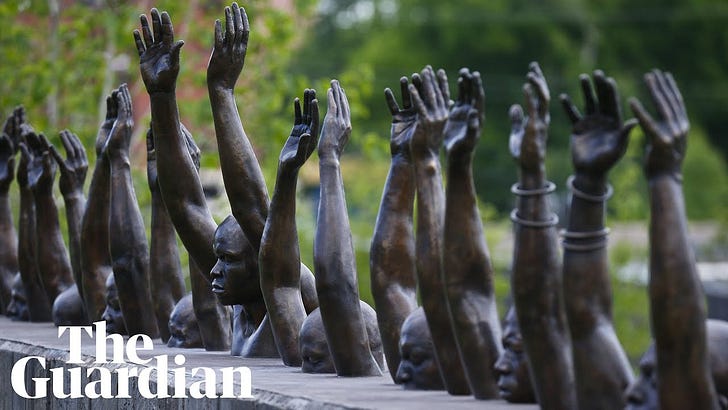WATER - manipulated extensions of racial terror, then and now.
The painful relationship between water and colonization. Water is no less sacred than land.
In February, I had the honor of having my article published in the Wabash Journal of Teaching. In it, I explore the profound and often painful relationship between water and colonization—a relationship that reflects both the beauty of God’s creation and the ways it has been weaponized against God’s people and non-human life in Gaza.
Water, though distinct from land, is no less sacred. Yet, history reveals how its intrinsic value has been manipulated to serve the insatiable thirst for power. The waters of the Atlantic, for example, became a vessel of unimaginable suffering during the transatlantic slave trade, forcibly transporting my ancestors from their homeland to a stolen land. Even now, over 400 years later, I encounter echoes of this same oppressive logic in systems upheld by those who once claimed dominion over land and water.
In sacred texts, water symbolizes renewal and life. It cleanses in baptism, carries Moses to safety on the Nile, and reflects God’s covenant with His people. But under colonial systems validated by doctrines like the Papal Bulls—proclaiming enslavement as salvation—water was twisted into an instrument of domination. The same Atlantic waters that should symbolize freedom and connection were instead coerced into serving European empires’ brutal ideologies.
Yet, there is hope in reclaiming water’s sacred essence. Like Jochebed, who trusted the Nile to protect her son Moses, we can reclaim water as a source of life and liberation—a reminder that God’s creation was never meant to be subjugated but cherished.
As noted in Ryan Andrew Newson's research titled “Black Bodies in the Water,” the waters were compelled to serve as an extension of racial terror, acting as carriers and second wombs for innocent bodies forced to leave the land of the dying for the land of the eternally living. We are not only confronting a system that seeks to destroy human life. Paul writes to the church in Rome: (Romans 8:19-23)
19 For the creation waits with eager longing for the revealing of the children of God, 20 for the creation was subjected to futility, not of its own will, but by the will of the one who subjected it, in hope 21 that the creation itself will be set free from its enslavement to decay and will obtain the freedom of the glory of the children of God. 22 We know that the whole creation has been groaning together as it suffers together the pains of labor, 23 and not only the creation, but we ourselves, who have the first fruits of the Spirit, groan inwardly while we wait for adoption, the redemption of our bodies.
Water is not land but a part of the womb we refer to as Mother Earth. Paul writes that Creation is also enslaved. Creation is a sojourner, with my ancestors as witnesses to the enslavement. However, I choose to find hope in the truth that we will obtain the freedom of the glory of God’s children. Therefore I can recognize I am free while also fighting for freedom. I find this freedom in the memory narrative and healing experience of the Legacy Museum. See the Guardian’s report:
I will share more, but leave you with Quincy Jones’ classic “Many Rains Ago (Ishe Oluwa)” from the Roots Soundtrack: (click below to watch on youtube)
Lyrics
Weeping willow tree
Tell me what you know
River were you cryin'
Many rains ago? (Koleba je wo)
Sacred baobab tree
Lost your children to the sea
Taken from the land
Many rains ago Koleba je wo (goodbye Motherland)
When I die I'll live on and on
For many rains to come




